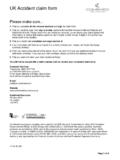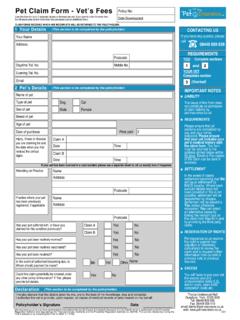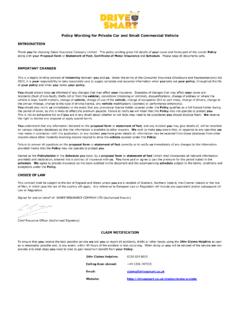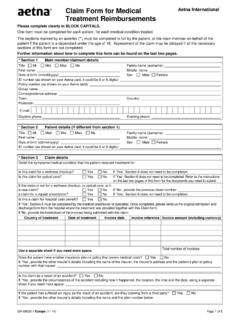Transcription of NHS healthcare for migrants with NRPF (England)
1 1 nrpf Network Factsheet NHS healthcare for migrants with nrpf (England) 1. Introduction This factsheet summarises the NHS healthcare people with no recourse to public funds ( nrpf ) can access in England and whether they will have to pay for this, changes that took place on 23 October 2017. Primary healthcare is delivered through GP practices, NHS walk-in centres, dentists, pharmacists and optometrists. These services can be accessed by everybody in England, regardless of immigration status and are mostly provided free of charge, although some, such as prescriptions and dental treatment, must be paid for by certain people, depending on their age, income or medical condition rather than their immigration status. However, certain migrants and some British citizens who live abroad will be required to pay for most types of secondary and community NHS healthcare , including NHS funded services provided by charities and local authority public health services, unless the treatment required is exempt from charging.
2 Full payment must be made up front for non-urgent treatment before services can be provided. This factsheet provides information on: Free healthcare services, including GP services Prescription, dentistry and optometry exemptions Chargeable secondary and community healthcare , including: who must pay and when, data shared with the Home Office, what to do if treatment is refused Immigration Health Charge EEA nationals and British citizens Other providers of medical care for migrants Details of changes implemented in 2017 The DH guidance referred to throughout is the December 2017 version of the Department of Health s Guidance on operating the overseas visitors charging regulations. NHS treatment is not a public fund for immigration purposes, so people who have nrpf are not prevented from accessing NHS services and should not be refused treatment on this basis alone.
3 2 2. Free healthcare services GP services GPs have the discretion to accept any person to be fully registered as an NHS patient in order to receive free treatment. GPs may also register a person as a temporary resident for free treatment if the person is present in the practice s area between 24 hours and three months. There is no minimum time period that a person needs to be in the UK before they can register with a GP. GPs have a duty to provide emergency or immediately necessary treatment free of charge, and 14 days of cover after such treatment is provided, even if the patient is not registered. NHS England provides guidance on GP registration, which confirms that registration may only be refused if one of the following applies: The patient lives outside of the GP s catchment area.
4 The practice has closed its list in agreement with the NHS commissioner. The practice has other reasonable grounds, providing these do not relate to race, gender, social class, age, religion, sexual orientation, appearance, disability, or a medical condition. NHS England also confirms that there is no requirement to prove identity, address or immigration status, so inability to provide identity or residence documentation would not be reasonable grounds to refuse to register a patient. NHS Choices provides information about how to register with a GP, including a leaflet for asylum seekers and refugees. NHS walk-in centres & minor injuries units Some minor illnesses and injuries can be treated free of charge and without the need for prior GP registration at: NHS walk-in centres Minor injuries units Secondary/community healthcare : free services Some types of secondary healthcare services must be provided free of charge to everyone because they are exempt from charging and are set out in regulation 9 of the National Health Service (Charges to Overseas Visitors) Regulations 2015: Accident and emergency (A&E) services up until the point that the person is accepted as an in-patient.
5 (Outpatient appointments are chargeable). Services provided as part of the "NHS 111" telephone advice line. Family planning services (not including pregnancy termination). Diagnosis and treatment of contagious diseases (as specified in Schedule1). Diagnosis and treatment of sexually transmitted infections. Treatment of a physical or mental condition caused by torture, female genital mutilation, domestic violence or sexual violence when the patient has not travelled to 3 the UK for the purpose of seeking such treatment. Chapter 7 of the DH guidance confirms how the NHS trust may identify such cases. Palliative care services provided by a registered palliative care charity or a community interest company, for example, a hospice (since 23 October 2017) People requiring such treatment may still be required to provide documents to confirm their nationality/immigration status as the NHS is still required to record whether they would otherwise be required to pay for treatment on their patient record see section Services provided by school nurses and health visitors remain free of charge for all - DH guidance, page 24.
6 3. Chargeable healthcare services NHS prescriptions and other primary care services Some people will need to pay for the following primary NHS services: NHS prescriptions NHS dental treatment Sight tests, glasses and contact lenses Travel to receive NHS treatment NHS wigs and fabric supports People who do not have to pay for most (or all) of these services are those who are: Age 60 or over Age under 16 Age 16-18 and in full-time education Pregnant, or have had a baby in the previous 12 months, and have a valid maternity exemption certificate Holding a medical exemption certificate because they have a certain medical condition People with nrpf who are receiving social services support will not be eligible for free prescriptions unless they fall into one of these groups.
7 If these exemptions do not apply, then a person with nrpf who has a low income may be entitled to full or partial help through the NHS Low Income Scheme by obtaining an HC2 certificate. An HC1 form must be completed, which can be requested from NHS choices. A person with nrpf who is receiving financial support from social services should not select that they are in receipt of benefits, otherwise the application is likely to be refused. Instead they should provide a letter from social services detailing what support is being provided. For more details, and to find out exactly what services will be free to each exempt group, see the NHS information, help with health costs. 4 Secondary and community healthcare NHS trusts, NHS foundation trusts (that manage hospitals), local authorities providing public health services and non-NHS organisations, including private providers and charities delivering NHS services, are required to charge some people for secondary and community healthcare services unless the treatment provided is exempt from charging - see section Community services which can be charged for include: maternity care provided in the community, district nursing services, drug and alcohol treatment services and mental health services - DH guidance pages 24, 32-33.
8 Section 175 of the National Health Service Act 2006 allows for charges to be made for non-primary healthcare services that are provided to anyone who is not ordinarily resident in the UK, and refers to such people as overseas visitors'. People who are not ordinarily resident in the UK and who are not exempt from charging must pay for most types of secondary and community healthcare . Anyone requiring these services is likely to be asked to confirm their nationality and immigration status to establish whether they are an overseas visitor who must pay for treatment. The NHS must record that a person is an overseas visitor on their patient record, including whether they are required to pay or not, even if the person needs a type of treatment which cannot be charged for see section Who can be ordinarily resident?
9 Anyone who is deemed to be ordinarily resident in the UK will not have to pay for secondary and community healthcare . healthcare providers will consider whether British citizens, European Economic Area (EEA) nationals, and non-EEA nationals who have settled status or a right to reside as a family member of an EEA national under European law are ordinarily resident, whether they are: living lawfully in the United Kingdom voluntarily and for settled purposes as part of the regular order of their life for the time being . Non-EEA nationals who do not have settled status or a right to reside as the family member of an EEA national cannot be considered to be ordinarily resident in the UK so this test will not apply to them - section 39 of the Immigration Act 2014. For more information see chapter 3 of the DH guidance and the ordinary residence tool.
10 Non-EEA nationals who do not have settled status in the UK, or EEA nationals and British citizens who are not ordinarily resident, will be overseas visitors and charged for secondary and community healthcare , unless an exemption applies. Which overseas visitors are exempt? Anyone who is not ordinarily resident in the UK will be referred to as an overseas visitor and must pay for treatment unless they are exempt. The exemptions are set out in the National Health Service (Charges to Overseas Visitors) Regulations 2015. 5 In some cases, an exemption can extend to family members who require treatment. A family member is defined at regulation 25(1) as a spouse or civil partner or a child for whom the migrant has parental responsibility. Generally, the family member must be lawfully present, but regulation 25 must be referred to as additional requirements may also apply.














